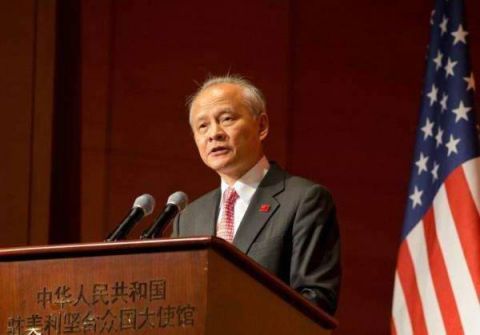
- Bloomberg reports, "Beijing is committed to striking a trade deal with the U.S. but it's ready to respond with more countermeasures, said Chinese envoy Cui Tiankai, as he called the blacklisting of Huawei an 'unusual' act of state power against a company. Cui said in an interview with Bloomberg TV Friday that China wants to continue working toward a trade agreement for President Donald Trump and Chinese President Xi Jinping to finalize. There's no official discussions about a meeting between the two leaders, said Cui, the Chinese ambassador to the U.S. The two sides should have cooperation and collaboration, he said, adding that 'trade is about mutual benefits, war is about mutual destruction. How can you put these two very different concepts in one term?' U.S. stocks traded higher on Friday, at the end of a bruising week in which escalating trade tensions dominated the market landscape."
- The Washington Post reports, "A top U.S. diplomat for Southeast Asia on Friday urged Pacific island nations not to withdraw diplomatic recognition of Taiwan, warning that Chinese pressure to change Taiwan's international standing threatens to increase the possibility of conflict. U.S. Acting Assistant Secretary for Southeast Asia W. Patrick Murphy spoke to reporters in Canberra at the end of a three-day Australian visit for talks with officials in the recently reelected government on expanding their security alliance. Six Pacific island nations give diplomatic recognition to Taiwan, accounting for a third of the self-governing democratic island's diplomatic allies around the world. But they are under intensifying pressure from Beijing to switch allegiances as it builds influence in the region. Murphy said diplomatic decisions should not be influenced by China."
The New York Times reports, "From the start, President Trump's combative trade strategy toward China has carried the promise that short-term pain inflicted on farmers would be worth the longer-term gains for American producers, from agriculture to technology. As the trade war intensifies, faith in that proposition among the president's most stalwart rural fans is being tested more than ever. 'How long is short-term?' Shane Goplin, a sixth-generation farmer growing soybeans and corn in west-central Wisconsin, wondered as he maneuvered his 16-row John Deere planter. China was the largest buyer of American soybeans until tit-for-tat tariffs all but halted the flow. And this month, souring prospects for a trade deal again sent prices tumbling. Mr. Trump responded on Thursday by announcing a $16 billion package to help those hurt by the dispute."
- 2019-05-23 Trump calls Huawei ‘dangerous’ but says dispute could be resolved in trade deal
- 2019-05-22 Trump administration considers banning another major Chinese firm
- 2019-05-21 U.S. Restrictions on Huawei Expose a High-Tech Achilles’ Heel for China
- 2019-05-20 As Huawei Loses Google, the U.S.-China Tech Cold War Gets Its Iron Curtain
- 2019-05-19 Rural America feels the sting of Trump's China trade war
- 2019-05-17 I.M. Pei, Master Architect Whose Buildings Dazzled the World, Dies at 102
- 2019-05-16 China Arrests 2 Canadians on Spying Charges, Deepening a Political Standoff
- 2019-05-15 Trump Moves to Ban Foreign Telecom Gear, Targeting Huawei and Escalating Battle With China
- 2019-05-14 U.S. prepares to slap tariffs on remaining Chinese imports,
- 2019-05-13 Trade row deepens as China ups tariffs on $60B in US goods
- Bloomberg China Commits to Trade Talks Amid 'Groundless' Huawei Suspicions
- The Washington Post US official urges Pacific nations to keep ties with Taiwan
- The New York Times Pain of Tariffs Tests Farmers' Faith in Trump: 'How Long Is Short-Term?'
- The New York Times Stocks Slide Over Worsening U.S.-China Trade Tensions
- CNN After years of fierce debate, Taiwan celebrates the first same-sex weddings in Asia
- The Washington Post Trump visits a Japan buffeted by U.S. trade war with China
- Reuters Light PBOC touch makes once unlikely yuan at 7/$ seem possible
- The Washington Post HK leader protests over German asylum for dissidents
- The New York Times Trump Gives Farmers $16 Billion in Aid Amid Prolonged China Trade War
- Reuters China aims for low value-added taxes in manufacturing, encourages innovation
- Bloomberg Trump's Latest China Target Includes a Rising Star in AI
- The New York Times Boat Capsizes on Southwest China River, 10 Dead, 8 Missing
- Reuters Xiaomi dismisses head of Africa arm for violating Chinese decency law
- The New York Times Who Is Playing Politics With the Port of Piraeus?
- Bloomberg Hold the Phones. Qualcomm May Have One Life Left.
- Forbes Do Not Doubt Trump's Tariffs On All 'Made In China' Goods
- Bloomberg China Trade War Is Music to a French Billionaire's Ears
- FiveThirtyEight Is The Economy Protecting Trump From A Trade War Backlash?
- Forbes A New Long March: Trade Or War? Xi Jinping Evoking Mao Zedong